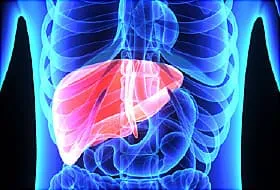Liver lesions are groups of abnormal cells in your liver. Your doctor may call them a mass or a tumor.
Noncancerous, or benign, liver lesions are common. They don’t spread to other areas of your body and don’t usually cause any health issues. But some liver lesions form as a result of cancer.
Who Gets Them?

- Hepatitis B or C: These viruses are the main cause of liver cancer.
- Cirrhosis: You may get this condition if you have hepatitis B or C or if you’re a heavy drinker. It happens when scar tissue grows in place of damaged liver cells, and it can lead to cancer. About 80% of people who are diagnosed with the most common type of liver cancer, hepatocellular carcinoma, have cirrhosis.
- Iron storage disease (hemochromatosis): This is one of the most common genetic disorders in the U.S. It makes your body take in too much iron from food. The extra iron gets stored in your organs, including your liver.
- Obesity : Non-alcoholic fatty liver disease (NAFLD) is typically seen in people who are overweight or obese. The condition is caused by a build up of fat in the liver.
- Arsenic: This chemical occurs naturally but can be poisonous. It’s sometimes found in drinking water.
- Aflatoxin: This toxin is created when mold grows on grain and nuts that aren’t stored the right way. It’s very rare in the U.S.
Symptoms
Benign liver lesions usually don’t cause any symptoms. Many people only find out they have one when they go for an imaging test, like an ultrasound, for a different health issue.
If it does cause problems, your symptoms will depend on the type you have. They might include:
- Bloating, swelling, or pain in your belly
- A feeling of fullness
- Nausea and vomiting
- Weight loss
- Feeling weak or tired
- Yellow skin or eyes
- Fever
Diagnosis
If your doctor thinks you might have a liver lesion, they’ll probably recommend one or more of these:
- Blood tests: They might use these to test for viral hepatitis or to see how well your liver is working. They also may want to check your level of a certain protein (alpha-fetoprotein, or AFP). High amounts of that can be a sign of liver cancer.
- Imaging tests: These can show where a lesion is on your liver and how big it is. A magnetic resonance imaging (MRI) scan uses powerful magnets and radio waves to make detailed images of your liver. A computed tomography (CT) scan is a series of X-rays put together to make a more complete picture. A positron emission tomography (PET) scan uses a special dye that makes your liver show up more clearly. And an ultrasound uses high-frequency sound waves to make live images of your liver.
- Biopsy: To rule out cancer, your doctor may want to take a small sample of the lesion to look for problem cells.
Treatment
If you don’t have any symptoms, you may not need to do anything about the lesion. If it’s causing issues for you but it’s not cancerous, your doctor may recommend surgery to take it out and ease your symptoms.
If the lesion is cancerous, you might need one or more of these:
- Chemotherapy: This is a combination of powerful drugs designed to kill cancer cells. It’s the most common treatment for liver lesions that are spreading to other parts of your body.
- Transarterial chemoembolization (TACE): This is a targeted type of chemotherapy that takes anti-cancer drugs directly to the lesion. They flow through a tiny tube called a catheter into the artery that brings blood to your liver. This also blocks some of the blood flow to your liver, which keeps the cancer cells from getting the oxygen they need to grow. TACE causes fewer side effects than regular chemotherapy.
- Radiofrequency ablation (RFA): If your lesion is small, your doctor may recommend this procedure. They’ll guide a small probe into the tumor in your liver, usually through tiny cuts in your belly. The probe will give off a certain kind of energy that heats up and kills cancerous cells.
Prevention
You can lower your chances of getting cancerous liver lesions if you exercise, stay at a healthy weight, and drink only in moderation (up to two drinks a day for men and one for women).
And you can do a few things to keep from getting hepatitis B or C, which cause 80% of liver cancer cases. You can get vaccinated against hepatitis B, wear condoms when you have sex, and don’t share needles if you use them to do recreational drugs.

